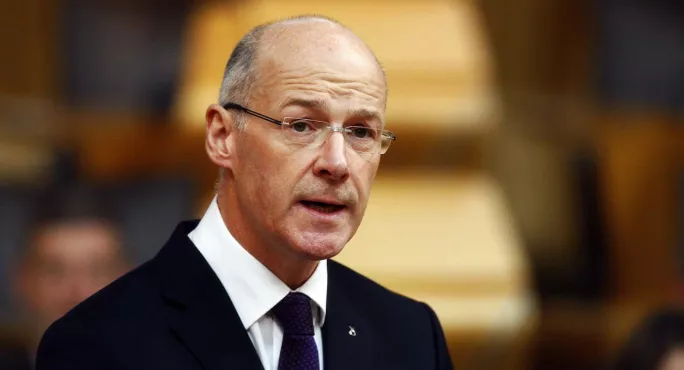- Home
- Swinney hits out at ‘overblown’ attacks on education
Swinney hits out at ‘overblown’ attacks on education

The education secretary has mounted a robust defence of the Scottish education system in a key speech delivered this morning at an Edinburgh secondary school.
John Swinney - who has come under pressure in recent months over the performance of the education system - hit out at the media for its “overblown and overhyped” coverage of education and at his political opponents for failing to look at the whole picture and acknowledge the system’s “successes”.
Background: Scottish curriculum review to be led by OECD
News: Top maths students struggling with numeracy
Related: John Swinney accused of behaving like an ‘old hippie’
Opinion: Why Parliament was right to want a curriculum review
More opinion: Why flawed curriculum design needs substantial change
The Scottish government has come under fire over its record on education thanks in part to the issues raised during the Scottish Parliament’s education and skills committee inquiry last year into fears the curriculum is narrowing.
That investigation highlighted research showing large drops in attainment since the new qualifications were introduced - although the methodology used has since been criticised. It also drew attention to the proliferation of multi-course teaching and the fact that subjects such as modern languages were being squeezed out of the curriculum.
The fall in the Higher pass rate last year, meanwhile, added fuel to the fire with Mr Swinney recently forced to publish the analysis he had sought in the wake of the results from bodies such as the Scottish Qualifications Authority, the Association of Directors of Education and Education Scotland.
Most recently, figures published yesterday showed the proportion of school leavers gaining at least one qualification at National 4, National 5, Higher and Advanced Higher dropped slightly across the board last year.
However, speaking today at the Wester Hailes Education Centre in Edinburgh, where first minister Nicola Sturgeon launched the Scottish Attainment Challenge in 2015, Mr Swinney insisted the Scottish education system was high performing.
He hit out at newspapers that published league tables that “hurt” pupils and “belittled” the achievements of schools facing “tough challenges”.
He told the educators and media gathered to hear him speak that it could not be expected that there would be “a continual increase in pass rates in a qualification system with credibility and rigour” and that “we should acknowledge volatility in pass rates”.
Mr Swinney accepted the drop in the Higher pass rate overall but argued that the majority of the top 10 “big subjects” had seen pass rate increases since 2015.
“Maths, chemistry, modern studies, physics, biology and geography - major subjects - are all up.”
He also highlighted the progress that had been made in terms of overall attainment over the longer term.
Almost 30 per cent of pupils were achieving at least five Higher passes, up from just 20 per cent in 2009, and the number of young people who are achieving skills-based qualifications has increased from 47,747 in 2014 to over 64,000 in 2019, he said, adding: “That is the progress that has been delivered.”
Mr Swinney added that of the 11 key measures to assess progress on closing the gap, there had been improvement in two-thirds. Presumably, this was a response to the revelation earlier this year that the government was unlikely to hit its targets for closing the gap in literacy and numeracy attainment in primary.
However, he said he was not “claiming that everything is wonderful in education”. He said there was a need for schools to have more “autonomy and flexibility” and to “invest further in teacher professionalism...to ensure that we have confident educators in every school”.
He revealed the remit for the review of Curriculum for Excellence but called for it not to be a “distraction” from work to close the poverty-related attainment gap.
The reality, he said, was that pupils today had “more choices and options than they have ever had before” and he concluded by calling for educators to take the opportunity of the review “to discuss and debate what we want Curriculum for Excellence to be over the next 10 years”.
Keep reading for just £1 per month
You've reached your limit of free articles this month. Subscribe for £1 per month for three months and get:
- Unlimited access to all Tes magazine content
- Exclusive subscriber-only stories
- Award-winning email newsletters



